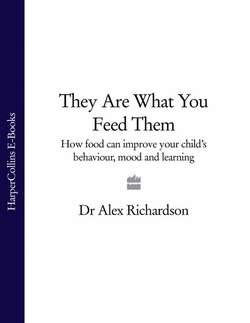Читать книгу They Are What You Feed Them: How Food Can Improve Your Child’s Behaviour, Mood and Learning - Dr Richardson Alex - Страница 34
FAQs
ОглавлениеWhy is there so much conflicting advice, and how do I know which advice to follow?
Much of the information and advice you get about food and diet is really aimed at selling you something. Many news and media stories are actually based on company press releases, so always be suspicious. Look carefully at the results and conclusions of proper trials (many can be found on the Internet with user-friendly summaries—see the FAB Research website for examples). In some areas, reliable evidence really is lacking. The best thing you can do is to keep an open mind—but not so open that your brains fall out, as they say! Read, observe, talk to people, ask questions, weigh up all the evidence and make your own mind up which advice you’re going to follow.
I thought doctors say a good diet is important so we don’t get fat? My child seems slim and fit even though he eats mostly chicken nuggets and chips, and he won’t touch fruit and vegetables.
A poor diet doesn’t always make you fat, and your child may look ‘slim and fit’, but have you seen his insides? It can sometimes take years for the effects of bad eating habits to show, but a diet of highly processed foods and insufficient fruit and vegetables really can damage physical and mental well-being. Some children are more resilient than others—and yours may be one of the lucky ones (so far)—but the time to start making some changes is now.
Surely if what the big companies say is wrong, the Government would ban them from saying it?
I wish! Sadly, economics and politics play a huge role here—for example, look at how long it took for the tobacco industry to be exposed for what they were really doing. The Government can’t regulate everything, and their perspective is usually very short term. They are also keen to avoid offending the big players in industry—for many reasons, some good (to try to protect jobs that might be lost, for example) and some not so good.
Why aren’t doctors and many other health professionals trained more in nutrition?
In my view, they need to be—and the more enlightened ones carry on studying such subjects after their initial training. In defence of the others, they are often so busy dealing with acute problems that preventative approaches may take second place, and they have little or no time to study. In my opinion, some training in the effects of nutrition on behaviour really would reduce the workload of most professionals in our health, education, social services and criminal justice systems, with benefits all round.
Who am I to question the experts?
Well, for a start, you’ll find that the experts usually disagree! As to ‘who you are’, please try to have a little more faith in your own good sense. If you’re a parent, you’ll probably know more about your child than anyone, and if you’re reading this book then you’ve got what it takes to find out more. Then make your mind up as to the best course of action. It’s usually one based on common sense and grounding in all the facts. I’d say always question the experts. (If they can’t handle that—they’re no experts!)
